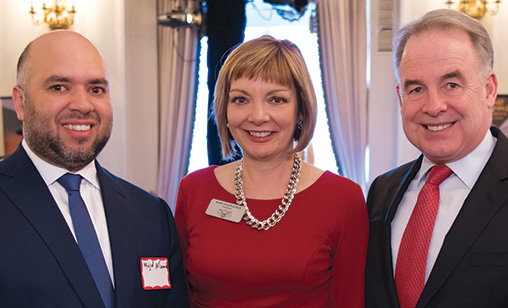Addendum
Etihad’s Hogan stands his ground on open skies
May 1st 2016
Delivering the keynote address at The Wings Club, New York, in April, Etihad Airways’ James Hogan said his airline was “a tiny player in the U.S. air travel market, with less than 0.01% of daily international departures”. However, he said, “we have been able to offer major benefits to the United States”. Read More »
 |
| His Excellency Majid Al Suwaidi, consul general United Arab Emirates New York, Mary Ellen Jones, The Wings Club president and Pratt & Whitney vice president sales for the Asia-Pacific and China and Etihad Airways president and CEO, James Hogan |
“We connect the U.S., through our Abu Dhabi hub, with scores of markets that are not served by other carriers,” he said. “That means we are feeding hundreds of thousands of travelers, both leisure and business, into the U.S. Hundreds of thousands of those get fed onto U.S. carriers.”
Hogan told his American audience that many of the issues raised by the Big Three North American carriers in their Open Skies campaign against Etihad stemmed from a limited understanding of the airline’s business model.
“There are many myths about our business. The truth is we run a commercial organization with a shareholder that demands a clear return on its investment. We get no subsidiaries or state support,” he said.
“What we have had is the investment required to compete in a capital intensive business. That is a smart investment when you consider the many advantages Abu Dhabi offers as the focus for a global network airline - as long as there is a return.”
He continued: “global air travel is a business with incredibly high barriers to entry – not just in cost, but in market access, infrastructure requirements and the need to compete against established mega-carriers.
“The highest barrier is network. You can’t build a global network overnight – in fact you need decades and billions of dollars to compete against the major airline groups.
“That is where partnership comes in. From day one, we have taken an open partnership approach, working with scores of airlines with code share agreements and then minority investments in strategically places airlines,” he said.
Last year, American Airlines, Delta Air Lines and United Airlines submitted a White Paper to the U.S. government that claimed the three major Gulf carriers had received $40 million in subsidies, funding that gave them an advantage when building market share in competition with North American airlines.